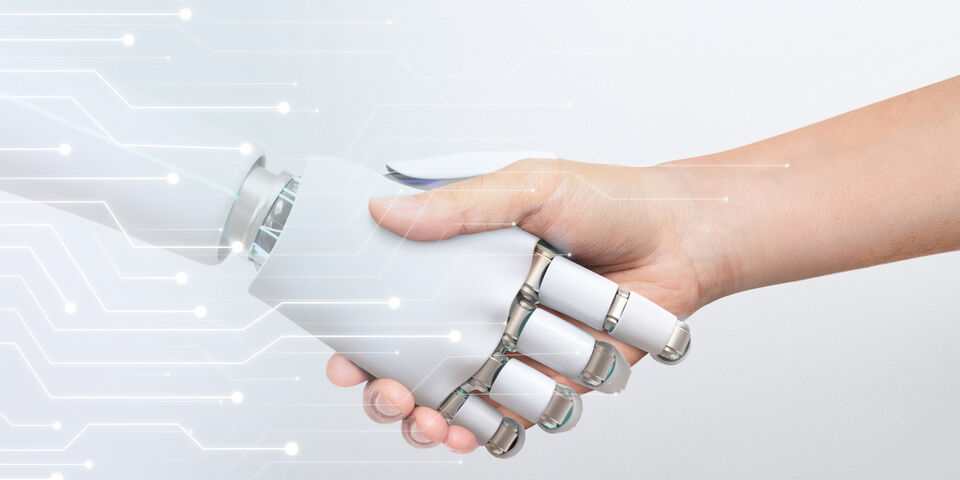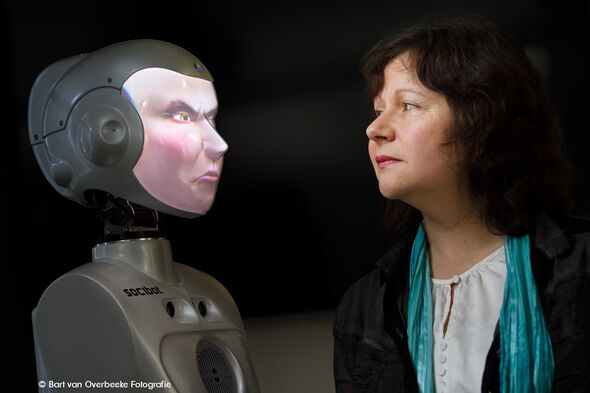Robots as our partners: a glimpse into the future
How will humans and robots be able to work together effectively in the future? During the RO-MAN conference, taking place this week at TU/e, experts are exploring which skills robots need to become true partners and what technological and ethical challenges come with it.
Rather than replacing us, robots are increasingly becoming our partners, performing tasks alongside us and engaging in interactions—not only in the workplace, but also in healthcare, education, and even at home. Collaborating with robots offers clear advantages: they can take over repetitive or physically demanding tasks, make our work more efficient, and even enhance social interactions or creativity.
At the same time, this raises questions: how can we ensure smooth cooperation between humans and robots, and what social or ethical challenges does this entail? One concrete example is a social robot in a care facility that keeps elderly residents company and assists with simple tasks, giving staff more time for personal care.
Largest edition
During the RO-MAN conference, which is organized by TU/e’s Department of Industrial Design in collaboration with Industrial Engineering & Inovation Sciences and Mechanical Engineering departments, these topics are at the forefront: how can humans and robots collaborate, which interaction models work best, and which skills do robots need to become real partners?
“With over seven hundred attendees, this 34th edition is the largest so far,” says Emilia Barakova, General Chair of the conference and Associate Professor at the Department of Industrial Design. Her research focuses on Social Robots and Embodied Intelligent Agents that support people through social interaction and mental support to facilitate healthcare, education, and everyday life. Barakova works on applications for a wide range of users, from children with autism and neurotypical students to elderly individuals and persons with intellectual disability who need extra support.
Ethical considerations
At RO-MAN, experts explore how to shape a future in which social robots optimally support humans and collaborate effectively. “It’s a multidisciplinary field that integrates expertise from engineering, social sciences (psychology, communication), humanities, and cognitive sciences to develop robots capable of seamless interaction with humans,” says Barakova. The questions range from technological challenges, such as navigation and speech or facial recognition, to psychological issues: how do we ensure that robots are socially accepted, trusted, and able to communicate effectively?
Ethical questions are essential to the field and the conference. For example, should we entrust the care of elderly people or young children to robots? “Many people emphasize that the warmth and tenderness of human contact cannot be replaced by robots,” Barakova explains. “It’s crucial to carefully consider which interactions robots have with people, with which groups, and in what way.”
At the same time, research highlights the benefits robots can provide. “For example, robots can help children with autism develop social skills by creating situations in which the child responds and then receives a positive, socially appropriate response in return. Many children find interactions with people difficult, but practicing with robots in a safe environment results in successfully applying these skills in the real world, as our randomized clinical trial shows.”
Empathy and trust
One of the workshops at RO-MAN focuses on creating empathetic robots. Empathy is essential for natural human-robot interactions and goes far beyond simple emotion recognition or display. Since intrinsic empathetic machines do not yet exist, the focus is first on understanding human empathy and the role of non-verbal communication, such as body language and vocal expression. By combining insights from psychology, linguistics, and sensor technology, researchers are working on an initial blueprint for truly empathetic robots.
Another major challenge in social robotics is the biases people hold. Often, people are skeptical: they fear robots will take their jobs, worry about physical safety or privacy, or feel uneasy about the unknown. Building trust is, therefore, one of the core topics at the conference.
“It’s essential that we deploy robots in ways that support people. For that, they must first be broadly accepted and embraced,” says Barakova. “Artificial intelligence-enabled robots are not here to replace us, but to help us, and this conference will make a step in that direction.”
The RO-MAN conference takes place from Monday, August 25, to Friday, August 29. For the full program and practical information, visit the conference website.
This article was translated using AI-assisted tools and reviewed by an editor.



Discussion